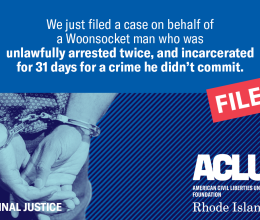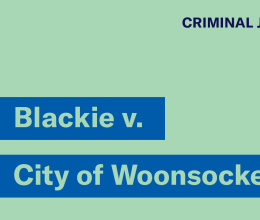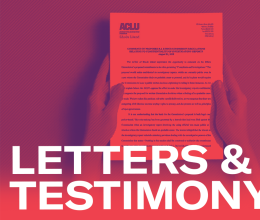Calling the decision “deeply disappointing,” the ACLU announced that U.S. District Court Judge Mary Lisi had today denied the organization’s request to submit a friend of the court brief to address the issue of imposing sanctions on the three attorneys in the Cornel Young, Jr. civil rights case. They are facing sanctions for allegedly misrepresenting the judge’s position in court papers.
In its motion filed last week asking permission to file a brief, the ACLU argued that the court’s decision to hold a hearing on possible sanctions “raises important questions as to the rights of parties to be represented by attorneys willing and able to engage in vigorous advocacy on their behalf, the due process rights of attorneys seeking to advocate zealously on behalf of their clients in cases which are both factually and legally complex, and the chilling effect on vigorous advocacy of sanctions inappropriately threatened or imposed.” However, the motion was denied with a one-word rejection.
ACLU volunteer attorney Amy R. Tabor, who had been working on the ACLU’s brief, said today: “The Court’s ruling today is deeply disappointing. The term ‘amicus curiae’ literally means ‘friend of the court.’ A major function of such a brief is to assist the Court in its decision-making by offering, for the Court’s consideration, the amicus’ analysis of the legal issues. Such briefs can be especially helpful when the issues before the Court involve matters of broad public concern.
“While a judge does have absolute discretion to refuse an amicus brief, it has been the ACLU’s experience that courts generally welcome the additional input of an amicus. Only a month ago, the First Circuit Court of Appeals included in its decision in the Rhode Island redistricting case a footnote expressing its ‘appreciation . . . for their valuable assistance’ to the groups, including the ACLU, that submitted friend of the court briefs in that case.
“In this case, we had hoped to draw to the Court’s attention the ACLU’s concerns about the civil liberties implications of imposing sanctions on attorneys based on several sentences contained in a memorandum submitted to the Court, when those sentences, read in the context of the entire memorandum, do not constitute any kind of fraud or misrepresentation. We deeply regret that we have been denied the opportunity to present these concerns.”
RI ACLU executive director Steven Brown added: “Past studies have shown that the sanctions that Leisa Young’s attorneys are facing, under a court rule known as Rule 11, are most often imposed on civil rights attorneys. The ACLU’s interest in providing input on the issues raised by the Court’s order is thus not abstract at all. While the court is, of course, free to disregard and disagree with the legal views we present, we at least hoped for the opportunity to make those views known in a case of such profound importance to both civil rights lawyers and the civil rights community.”







